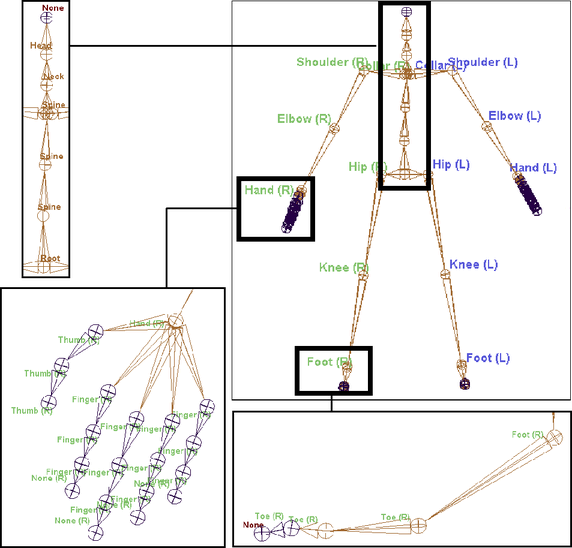There are a few methods
for labelling the joints of your skeleton:
Automatically label a skeleton’s
joints
To automatically label the joints of
your skeleton’s limbs
For the limbs of your
source and target skeletons, do the following:
- Select
Skeleton > Joint Labelling > Show All Labels.
Joints labels will now
appear in the scene view. See
Skeleton > Joint Labelling > Show All Labels.
- Select Skeleton > Joint Labelling
> Add Joint Labels.
- In the scene view, select the parent
or top joint of each limb (joint chain) in your skeleton and do
the following:
- Select Skeleton > Joint
Labelling > Add Joint Labels, then select a side label (Label
Center, Label Left, Label
Right) in the Add Joint Labels menu.
- Select Skeleton > Joint
Labelling > Add Joint Labels, then select a type label (Label
Arm or Label Leg).
Each joint, from the
selected parent down its joint chain’s hierarchy, is automatically
labeled according to their positions in their respective joint chain.
For example, if you select
the left shoulder joint of a skeleton and click Label
Left and then Label Arm in
the Add Joint Labels menu, then
that joint will be labelled as Shoulder(L),
the next joint in the chain will be automatically labeled as Elbow(L),
and the next joint will be labeled as Hand(L) and
so on.
NoteFor arms, the forearm
joint is labelled as an elbow joint. For legs, the ankle
joint is labelled as a foot joint.
- If you want to adjust or change the labels
of your joints,
Adjusting joint labels.
Adjusting joint labels
To set or adjust individual joint labels
from the Attribute Editor
- Select the joint in your source or target
skeleton whose labelling you want to change and open the Attribute
Editor.
- In the Joint section
of your joint node’s tab, expand Joint
Mapping.
The Side and Type drop-down
menus appear.
- Set or change the joint’s Side and Type labels
as desired.
